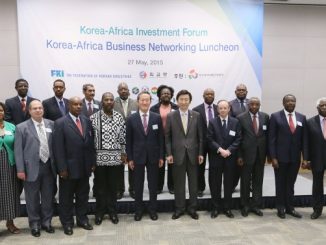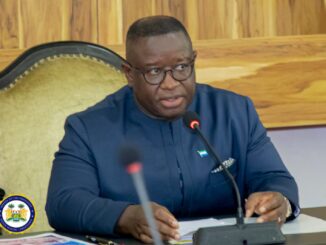
John Baimba Sesay- China
Decentralization is vital in the sustenance of participatory democracy given that it helps in bringing governments closer to the people. In the process, this allows openness in governance.
Sierra Leone’s decentralization process has come a long way, since 2004. The process was framed with a view of bringing back devolution of functions.
The councils, in line with the 2004 Act, are to initiate and maintain programmes for the development of basic infrastructure and provide works and services in the locality and “mobilize the human and material resources necessary for the overall development and welfare of the people of the locality” amongst other functions.
The local councils, according to the Act, are the “highest political authority” in their jurisdiction. This politically strengthens the councils as they have powers to enact and execute bylaws.
At their locality, the councils facilitate development by preparing a development plan, which serves as guide the growth of the locality. The ward members amongst other functions then mobilize residents of the ward for the implementation of self-help and development projects.
The ward, as per the Act, comprises every Councilor elected from the ward; “(b) the Paramount Chief of the Chiefdom, in the case of localities with a system of chieftaincy; and (c) not more than ten other persons, at least five of whom shall be women, resident in that ward and elected by the ward residents in a public meeting.” This eventually ensures community participation, more so women input.
Vivek Srivastava and Marco Larizza, in ‘Decentralization in Post conflict Sierra Leone: The Genie Is Out of the Bottle’, highlighted three forms of decentralization; political, fiscal and administrative from the perspective of Sierra Leone.
The councils, they argued, were not only to build popular legitimacy, but “sustain political stability, and reverse the massive urban/central bias that was a feature of Sierra Leone’s postcolonial politics.”
The success of the councils also depends on the level of fiscal decentralization. This is not only from the framework of what comes from the central government to the councils; it involves, too, the ability of the councils to effectively generate their revenues.
The councils, according to the Act, have their source of revenue: transfers from central government; councils’ own revenues-taxes, fees, licenses royalties, mining revenues, etc; and loans and grants from other sources.
Since 2008, there has been a unique increase and flow of funds to local councils, given the unflinching political will exhibited by the central government. Government continues to ensure the enabling space for the councils to operate and contribute positively to the democratic process.
The devolution process is up and running, with the councils being strengthened to be able to raise revenues. Today, councils have scaled “up the provision of social services, including primary and secondary health, primary and junior-secondary education, agricultural extension services…” (Source: The APC Manifesto 2012: Transformation for National Prosperity).
But to what extent have the councils also succeeded in locally generating revenues for their smooth operations given the support they have been enjoying from the central government and even from development partners?
They indeed have remained major players in the process of growth and I hold the view, they could do for they appear to be heavily dependent on central government for funding. Revenue sources for the councils comprise precepts from local taxes; property rates; licenses; fees and charges; share of mining revenues; interests and dividends amongst others.
Chairing the inaugural meeting of the Inter-Ministerial Committee on Decentralization in May 2015, Sierra Leone’s vice president, Hon. Victor Bockarie Foh underscored the need for resources to councils, that if they are to function effectively, they would need resources, saying the councils themselves should work hard in the area of revenue generation.
Precisely so! When councils operate effectively, they help in addressing the development priorities of the central government. They can be a conduit for socio-economic growth. They should therefore rise to that challenge!
Citizenry resolve to support the process is also vital. Until that is ensured, the councils will always be faced with a plethora of challenges. Sustained revenue mobilization is crucial for effective performance by the nineteen councils across the country!




